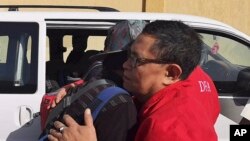Philippine diplomats have started evacuating a small group of Filipinos from the Libyan capital after it was hit by a barrage of rocket fire that wounded one Filipino, officials said Thursday.
Department of Foreign Affairs spokesman Emmanuel Fernandez said in Manila that three hospital workers and four students were evacuated by Philippine Embassy personnel from Tripoli to Tunisia, where they are to take flights back home.
Manila’s top diplomat in Tripoli, Elmer Cato, said 13 more Filipinos have sought help and are expected to be flown back home in the next few days. But of about 1,000 Filipinos in Tripoli, only 20 have so far asked to be repatriated, including a man who was wounded in the rocket fire late Tuesday in the Libyan capital, he said.
About 50 other Filipino workers have been evacuated to safer areas within Libya by their employers, Cato said.
There are more than 2,000 Filipinos in Libya, mostly working as nurses, teachers and oil industry workers.
“They have to stay here and take the risk because they have to provide for their families back home,” Cato told The Associated Press in a cellphone message, adding that Filipino nurses in Libya are treated well and receive much higher salaries, along with other benefits.
Last week, the Department of Foreign Affairs in Manila raised the threat level in Libya’s capital to 3 and urged Filipinos and their dependents in Tripoli and outlying areas to consider leaving temporarily to avoid getting caught in the fighting. If the threat level is raised to 4, the government would have to implement a forced evacuation of Filipinos.
The Philippine labor department has also imposed a ban on the deployment of Filipino workers to Libya, particularly in Tripoli and areas within a 100-kilometer (62-mile) radius of the capital, because of fighting between rival militias for control of the North African nation’s capital.
Many of the Filipinos in Tripoli refuse to return home because they feel the ongoing fighting would eventually ease, but Cato said that after the volleys of rocket fire hit Tripoli for the first time this week, some have started to consider to leave.
The Philippines is one of the world’s major labor providers, with a tenth of its more than 100 million people working abroad, including many house helpers and construction workers. The income they send home has helped the Philippine economy stay afloat in dire economic times.
The wounded Filipino in Tripoli, Rolando Torres, was in his living room when he was startled by two powerful explosions outside his house. He ran to another room to check what happened but before he could open a window, he heard another loud blast, which sent debris flying that wounded him in the forehead, Cato said.
Torres, a warehouse worker, immediately called the Philippine Embassy and was fetched later from his house.
The rocket fire struck a Tripoli community where more than 200 Filipino nurses and their dependents live. They stayed put and treated the wounded, mostly Libyans, in a clinic, Cato said.
On Wednesday night, the Philippine Embassy received reports that rockets struck a hospital south of Tripoli, where 15 Filipino nurses work. Filipino embassy personnel could not reach the Filipinos for hours but later managed to contact the hospital owner, who reported that the Filipinos were fine and would be moved to safety soon, Cato said.





